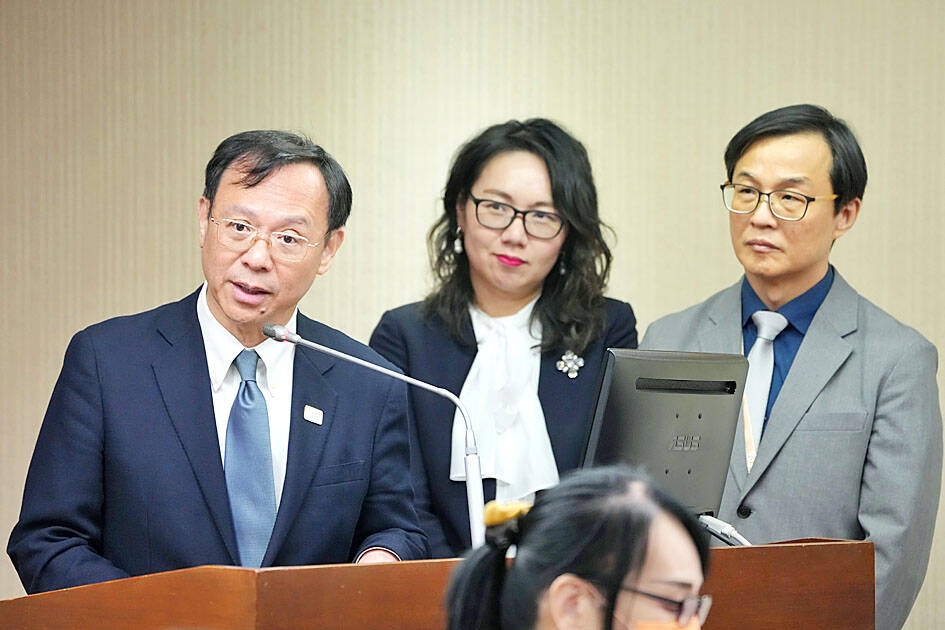Proposals to allow people to pay extra for imported brand-name drugs need careful consideration, as they might create a negative impression about domestically produced generic drugs, Minister of Health and Welfare Shih Chung-liang (石崇良) said yesterday.
The Food and Drug Administration (FDA) last week confirmed that as of last month, pharmaceutical companies had reported plans to discontinue supply of 47 types of drugs in Taiwan.
Shih on Sunday outlined the ministry’s plan to prevent panic buying or hoarding of drugs.

Photo: Chen Yi-kuan, Taipei Times
Speaking on the sidelines of a meeting of the legislature’s Social Welfare and Environmental Hygiene Committee yesterday morning, he said that the 47 types of drugs — mainly used to treat hypertension and high cholesterol levels — have expiring patents and can be substituted with generic drugs, so shortage should not be a problem.
Some doctors and pharmacists have proposed amending laws to allow balance billing of certain brand-name drugs — that is, patients can decide if they want to pay the difference between the price of a brand-name drug and the alternative generic drug covered by the National Health Insurance.
Asked about the suggestion, Shih said careful assessment and consideration are needed to decide whether to introduce such a system.
Some countries, including Taiwan, follow the policy of paying the same price for drugs of the same “ingredients, dosage and dosage form,” while others allow drug companies to set different prices for the same drug, he said.
However, allowing people to pay extra for brand-name drugs would not only affect the cost of treatment for patients, but might also affect the development of domestically produced generic drugs, Shih said.
The government is promoting the generic drug industry, so the ministry needs to consider whether brand-name drugs with expired patents and substitute generic drugs can be priced differently, he said, adding that it might create a negative impression about locally made drugs.
Allowing the public to pay extra for imported brand-name drugs might also have a negative effect on Taiwan’s drug supply resilience, especially its goal of reducing dependence on imported drugs, he added.
At the meeting, legislators asked why the FDA received a report about suspected industrial-grade hydrogen peroxide tainted pork intestines by Pai Wei Foods Co in June, but only took action to remove the tainted products from the market this month.
Shih acknowledged flaws in the FDA’s handling procedures.
Saying he eats noodles with pork intestine nearly every week, Shih said he deeply feels the public concern over this issue.
The ministry will reflect on its behavior and adjust its procedures to ensure food safety, he said.
However, he added that there is a serious shortage of food safety inspectors.
There are more than 710,000 legally registered food businesses, and about 160,000 underwent inspections last year, he said, adding that it might take up to four years to inspect all businesses.
While businesses that have failed inspections would be subject to more frequent inspections, Pai Wei Foods was not listed among these high-risk companies, Shih said.
A NT$54 million (US$1.76 million) fine has been imposed on the company, the highest among similar cases, he said.

The manufacture of the remaining 28 M1A2T Abrams tanks Taiwan purchased from the US has recently been completed, and they are expected to be delivered within the next one to two months, a source said yesterday. The Ministry of National Defense is arranging cargo ships to transport the tanks to Taiwan as soon as possible, said the source, who is familiar with the matter. The estimated arrival time ranges from late this month to early next month, the source said. The 28 Abrams tanks make up the third and final batch of a total of 108 tanks, valued at about NT$40.5 billion

Two Taiwanese prosecutors were questioned by Chinese security personnel at their hotel during a trip to China’s Henan Province this month, the Mainland Affairs Council (MAC) said yesterday. The officers had personal information on the prosecutors, including “when they were assigned to their posts, their work locations and job titles,” MAC Deputy Minister and spokesman Liang Wen-chieh (梁文傑) said. On top of asking about their agencies and positions, the officers also questioned the prosecutors about the Cross-Strait Joint Crime-Fighting and Judicial Mutual Assistance Agreement, a pact that serves as the framework for Taiwan-China cooperation on combating crime and providing judicial assistance, Liang

A group from the Taiwanese Designers in Australia association yesterday represented Taiwan at the Midsumma Pride March in Melbourne. The march, held in the St. Kilda suburb, is the city’s largest LGBTQIA+ parade and the flagship event of the annual Midsumma Festival. It attracted more than 45,000 spectators who supported the 400 groups and 10,000 marchers that participated this year, the association said. Taiwanese Designers said they organized a team to march for Taiwan this year, joining politicians, government agencies, professionals and community organizations in showing support for LGBTQIA+ people and diverse communities. As the first country in Asia to legalize same-sex

MOTIVES QUESTIONED The PLA considers Xi’s policies toward Taiwan to be driven by personal considerations rather than military assessment, the Epoch Times reports Chinese President Xi Jinping’s (習近平) latest purge of the Chinese People’s Liberation Army (PLA) leadership might have been prompted by the military’s opposition to plans of invading Taiwan, the Epoch Times said. The Chinese military opposes waging war against Taiwan by a large consensus, putting it at odds with Xi’s vision, the Falun Gong-affiliated daily said in a report on Thursday, citing anonymous sources with insight into the PLA’s inner workings. The opposition is not the opinion of a few generals, but a widely shared view among the PLA cadre, the Epoch Times cited them as saying. “Chinese forces know full well that